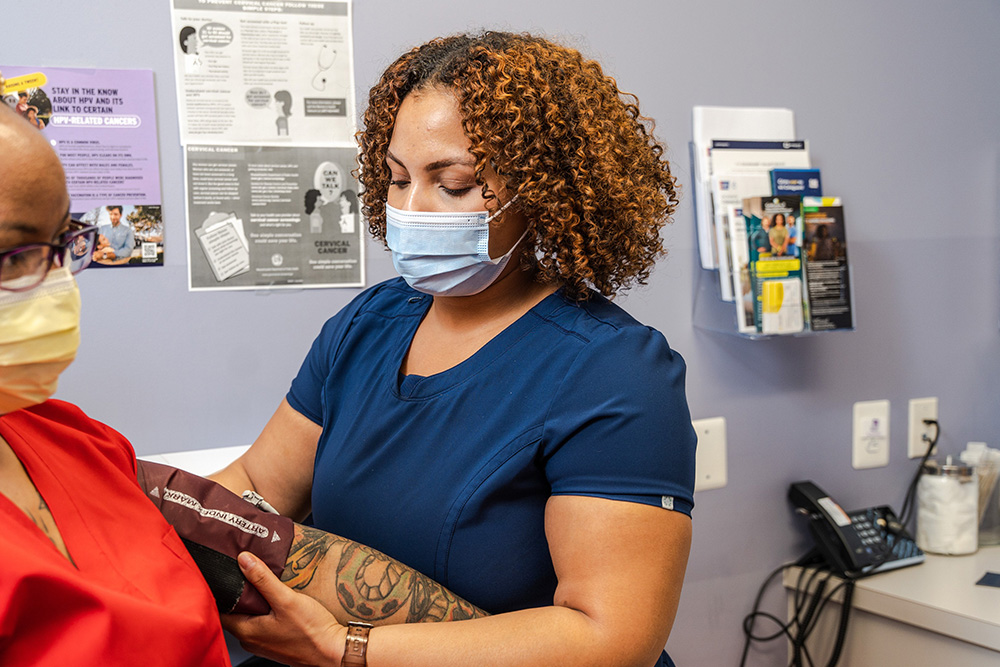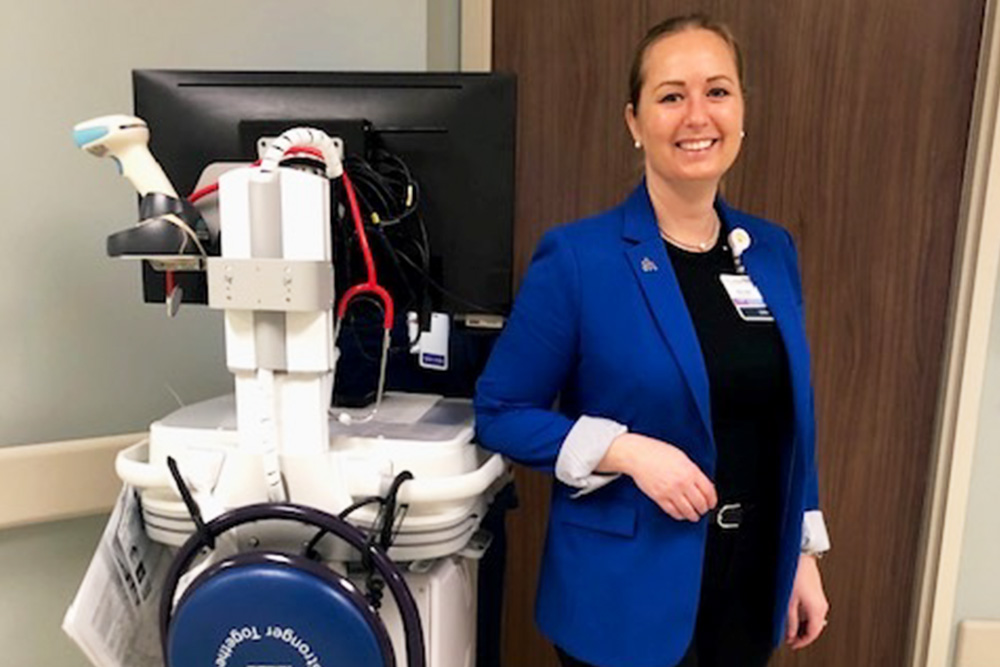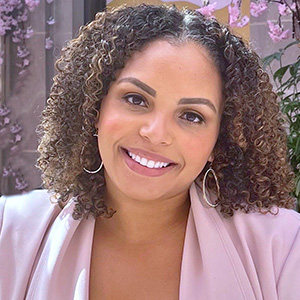
A Job Tailor-Made for a CNL
Imani Marks (CNL ’19) never thought becoming a CNL would make her quit.
Few places offer CNLs jobs designed specifically for their skills and education. But with demand for nurses at a peak, that might be starting to change.
After all, she loved the emergency department (ED) where she worked: the patients, the pace, her colleagues, and her contribution. With a master’s degree and CNL certification in hand, Marks was eager to use her new tools and know-how to forge the ED’s path away from its “business as usual” approach.
But while she could visualize using evidence to improve care, boost efficiency, and build morale, it was clear her ED wasn’t ready. And with a CNL’s sense of clarity, Marks knew it was time to move on.
“Because of my education at UVA, I was able to recognize there weren’t great options for quality improvement where I was working,” she said, “which, for me, would have translated into regret.”
Now nursing director of clinical services at the Washington, D.C.-based Community of Hope, a federally qualified health center, Marks’ new role, though not specifically designated for a CNL, is a great match for her penchant for leading, working inter-professionally, managing complex populations, and helping stakeholders navigate toward goals—all things CNLs are educated to do. Now entering year three, Marks has found another purpose and professional home, this time as a CNL at the helm.
“I think that it was immediately evident that I had a special ability to think both big and small—from universal themes to microsystem evaluations,” Marks said, “and to look at a problem not as a hindrance but rather an opportunity.”
Pandemic stress has put healthcare in a reactive posture.
Given both an unprecedented need for nurses and a hope to build and retain an exceptional workforce, many health systems are looking up and planning for a more resilient future. And CNLs like Marks are key players in shaping it.
Though the Clinical Nurse Leader—an advanced generalist role conceptualized by the American Association of Colleges of Nursing more than 20 years ago—is a direct care and systems improvement pro, few healthcare systems have designed jobs just for them yet.
That's starting to change. Driven by nurse burnout, clinician attrition, and growing demand for systems—sea changes borne out of COVID-19—a new cadre of roles made just for CNLs are coming into focus.
And while many CNL graduates still begin their careers in entry-level generalist positions before rising quickly in the ranks, there are hints that CNL-specific roles are, in some pockets, being tailor-made for this special brand of nurse.
There are several key differences in a CNL's education. In addition to learning the mechanics of nursing care, they're pushed to explore the rationale of care, dive deep into evidence-based practice, and grow nimble in using research to conceptualize, guide, and evaluate interventions and changes. Research has repeatedly demonstrated that CNLs make excellent unit teammates, are resilient, and enjoy professional longevity, making them highly sought-after.
In a moment when more health systems are reexamining staffing protocols and how they attract, build, and retain exceptional caregivers, many CNLs are getting a second look.
Since the CNL role was conceived, there have been few attempts to study their impact, mostly with mixed results. The Veterans' Health Administration (VHA) developed CNL-specific roles more than a decade ago and, in 2020, studied CNLs' impact on outcomes in patient care, quality, and nurse retention.
The VHA's study, however—which showed CNLs had little to no effect—was fatally flawed. Given that their CNL roles weren't standardized, often included case management and bedside care duties, and were often filled by nurses who hadn't earned a CNL, it's clear that a broader study of CNL-specific roles' impact is warranted—and more than a little ironic that the nursing role most dedicated to evidence-based practice is woefully under-studied.
Richard Ridge (PhD' 01) has been watching CNLs' job prospects since the role's conception in 2003. Now UVA's CNL program co-director, an assistant professor, and the Virginia Nurses Association's commissioner on workforce issues, Ridge said hospitals' sluggish development of CNL-specific roles may finally be quickening its pace. He points to three factors influencing the change.
One, said Ridge, hospital leaders must more "fully understand the CNL role." Two, a critical mass of available CNLs must be present to create an abundant applicant pool, he said. And three, CNL-specific roles must be viewed as a cost-saving measure. "In the climate of high turnover and expensive travel contract nurses, the role of CNL may help retain experienced nurses and lower staffing expenses," Ridge explained. If CNLs can be shown to be a good financial bet, more roles will be designed just for them.
It could be the moment, intoned Ridge, for the CNL title to stop being a wallflower and claim center stage.

50%+
percentage of UVA CNL graduates who take their first nursing position at UVA Health
Those factors are precisely why Chief Nursing Officer Kathy Baker is making it her mission to bring more CNL-specific roles to UVA Health. With Pam DeGuzman (COLL ’92, BSN ’96, Darden ’00, MSN ’00, PhD ’12), a nurse scientist and professor, she’s conceptualizing eight new CNL-specific positions that will be posted later this spring.
In a typical year, more than half of CNL graduates head to UVA Health for their first nursing jobs. Baker said she wants even more of these graduates to make the hospital their “forever” professional home by mentoring their peers.
“We recognize CNL students as some of the strongest leaders coming from the School of Nursing,” Baker explained, “but retention has sometimes been challenging. For quality care and patient safety, we need strong nurse leaders like these CNLs to stay at the bedside and support their nurse peers through education, research, and encouraging them to further their own education and careers.”
UVA Health’s new CNL-specific roles will position CNL-educated nurses to broaden their influence on care and nurse retention without leaving bedside care entirely. Rather than the “either-or” model—all patient care or all systems improvement, supervision, and leadership—UVA Health’s new pilot CNL roles will offer advancement through a novel “both-and” model.
Baker said CNLs with greater on-unit agency would improve care quality. “Pushing decision-making to the level closest to patient care delivery, precisely where a CNL does their work, improves outcomes,” said Baker.
As part of a system devoted to transformational change, CNLs will find a happy home at UVA Health, DeGuzman added, able to improve retention, build agency, and ensure that evidence-based changes—often infamously slow as they cross from scientific journal to patient bedsides—“speed up the divide.”
While similar to Clinician I and II roles, the eight new CNL-specific hires will require at least two years of experience and will pay significantly more—up to $137,000 annually. UVA’s CNLs will be expected to evaluate the changes they implement on their units. DeGuzman and Baker also plan to standardize the new CNL positions and track metrics to determine their impact, hopefully adding to the literature affirming the rollout of CNL-specific job models more broadly.
up to $137K per year salary
Eight new CNL-specific roles at UVA Health compensate differently than traditional Clinician I, II, and III positions
After seven years as an active-duty combat medic, Heather Norman (CNL' 08) had up close and personal experience with trauma medicine. But if the birth of her medically complex daughter initially brought her to Charlottesville, UVA's CNL program transformed her nursing leadership ability.
Many years and roles later, Norman—now the chief nursing officer at Nashville-based Wellpath, a healthcare organization that operates in 36 states and employs more than 7,000 nurses—said her CNL education remains foundational to her leadership philosophy and nursing ethos.
"I still strive to find the art of the possible," said Norman, "even when a change questions the stubborn reasoning of 'this is the way we've always done things.' We create the outcomes of our patients' experience. When we understand this, it gives us the responsibility and agency to improve them."
Sounds like a CNL to us.

Learn more about the Clinical Nurse Leader program and the new roles for CNLs at UVA Health.

